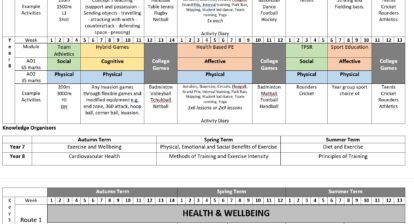Academic Research in PE
What is recognised as ability in physical education? A systematic appraisal of how ability and ability differences are socially constructed within mainstream secondary school physical education
Download
Wilkinson Littlefair Barlow-Meade 2013
Abstract
In sport, schools and physical education (PE) ability has invariably been understood as an inherent
and relatively immutable capacity, amendable to varying degrees by interventions such as training
regimes and education. Differences in achievement are assumed to be an inevitable consequence of
natural variations in ability and an indication of motivation or effort. Drawing on the theoretical
tools of Pierre Bourdieu, Evans, in 2004, proposed an alternative socially constructed perspective
of ability. Evans suggested that an individual’s embodied dispositions can function as capital and thus
be ‘perceived as abilities when defined relationally with reference to attitudes, values and mores
prevailing within a discursive field’ (e.g. PE). Drawing on the data of existing socially critical
research on the social construction of ability, this paper takes the form of a systematic appraisal.
Systematic searches were conducted in numerous electronic databases and electronic journals and
contact was made with authors to identify relevant studies. Nine studies in total complied with a
pre-determined inclusion/exclusion criteria. The data for the studies included in this appraisal are
for the most part located in Queensland, Australia and to a lesser extent Sweden. Therefore,
importantly, the Australian and Swedish contexts are the focus of this report. The aims of this
systematic appraisal are to investigate how ability is socially constructed (conceived of and re/produced)
in PE and how conceptualisations of ability in the subject influence students’ learning,
experiences and potential achievement. The conclusions of this paper suggest that teachers and
the PE curriculum in Queensland, Australia and Sweden play a significant role in (re)producing
particular discourses around the body which reward (with ‘high’ ability identification) only those
few (mostly male) students whose abilities are consistent with the values prevailing within the field
(e.g. being competitive and aggressive). The limited acknowledgement of a ‘range’ of abilities in the
subject leads to many students (both male and female) perceiving themselves incapable of being
successful, not because they lack ability per se but rather because their abilities are not recognised
or transactable for high achievement grades in the field.





